Menu
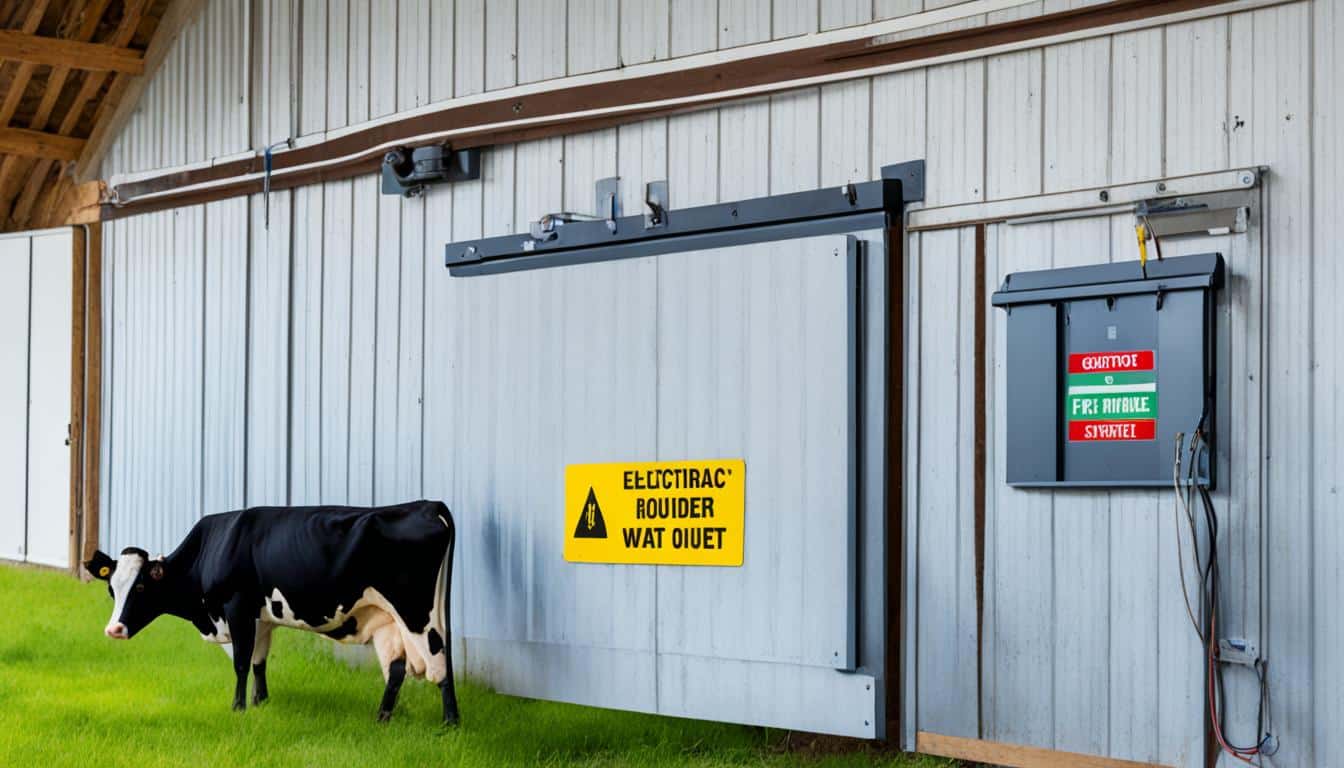
Are you doing enough to stop the next electrical danger on your farm?
Electric safety on farms is a big deal. It stops fires and people getting hurt or even dying. Farms face lots of electrical risks. This is because of the many tools and buildings near power lines.
To keep the farm safe from electricity, do some key things. You should check if the outlets have good three-wire grounding for big tools. Make sure any electric wires aren’t loose or damaged. Also, think about if all the electrical cords are still safe to use.
Always ground tools that stand still and keep electric things locked away. Be careful of power lines above. Also, always teach farm workers about electrical safety.
Check plugs, switches, and wall sockets often. It is smart to know how to turn off power fast in an emergency. Keep a record of all your safety checks. This will help make sure the farm stays safe in the future.
By following all these tips, farms can be much safer. This reduces the chance of accidents a lot. It helps everyone work in a safer place.
Farms are vibrant places, but they also pose unique dangers. Electrical safety is crucial, shaping many rules and checks on farms. It’s vital to have a dependable power supply for farm work. As farm machines get bigger, the danger of hitting power lines increases.
To reduce risk, it’s important to avoid certain tasks near power lines. Proper power management and using grounded equipment create a safer farm. This is key to keeping everyone at the farm out of harm’s way.
Badly kept tools, machine problems, and extension cables often cause farm accidents. Fires from these issues can ruin buildings and harm animals. It’s why regular electrical checks and following safety rules matter so much. Using safe cables and having enough power outlets are also essential.
Hiring skilled electricians ensures your farm’s electrical systems are safe. They make sure everything meets the right safety standards. Outdoor tools should be connected to special safety devices. These devices quickly cut the power if there’s a problem.
It’s also smart to plan work near power lines carefully. Communicating with power authorities and keeping an eye on your wiring helps. Regular safety checks and making sure workers are trained well are vital. This cuts down on accidents and keeps everyone safe.
If working near power lines is unavoidable, strict safety protocols must be followed. Safety procedures are there to prevent shock or burns. Even nonmetal objects can conduct electricity, so they need to be handled with care too. Training is essential for all farm workers to know how to stay safe.
Keeping safe around electricity on farms is vital for people and animals. There are many risks, but you can reduce the danger by knowing safety rules and taking precautions.
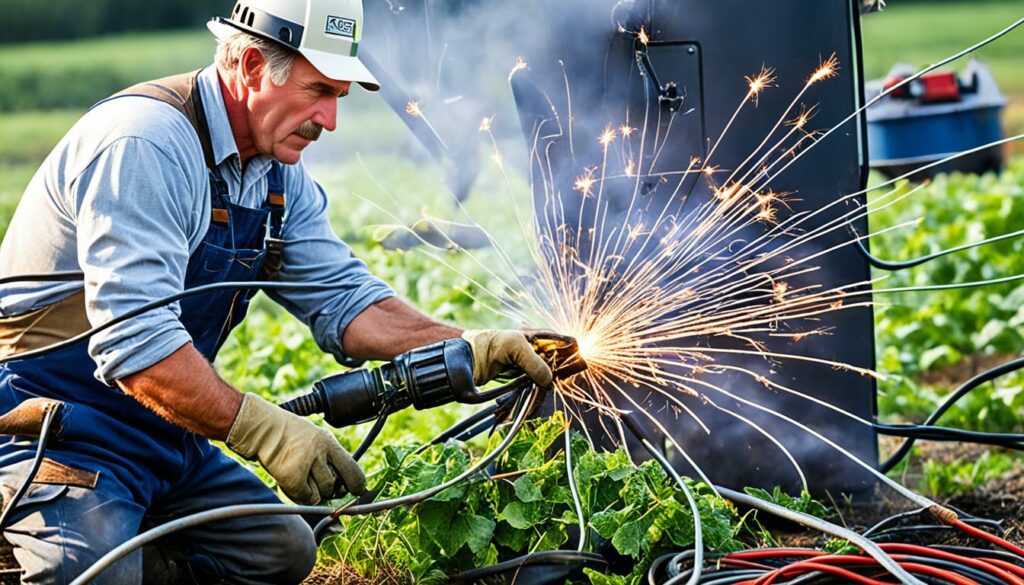
Power lines without protection are very dangerous. Always keep a safe distance from them. This is to avoid being shocked or hit by sparks. If a power line has fallen, stay 10 meters away and call for help. Remember that power lines can sag and touch farm equipment if they get too hot or are under too much pressure.
Faulty wiring can start fires or shock you. Check wires and extension cords often for any damage. Keep wiring inside safe from harm and use the right kind of cable – UF for most areas. Always make sure the whole system is grounded properly. Test Ground Fault Circuit Interrupters every month to ensure they work.
Too much load on circuits is a big risk. Don’t overload your power sources. Leave three feet of space in front of electrical panels. Use outdoor-safe gear when needed. For any electrical concerns, talk to an expert. Following safety rules is key to farm safety for workers and machines.
| Hazard | Preventive Measures |
|---|---|
| Unprotected Power Lines | Maintain at least three meters distance, avoid sagging lines, contact emergency services for downed lines |
| Faulty Wiring | Regular inspections, proper grounding, use of Type UF cables, monthly GFCI checks |
| Overloaded Circuits | Avoid circuit overloading, ensure clearance around panels, outdoor-rated equipment usage |
Know about these electrical dangers and keep to the safety rules. This will cut the risk of shocks and fires on the farm. Always watch out and make sure safety steps are up-to-date.
Keeping farm electrical outlets and tools safe is vital. It helps prevent accidents and keeps the work area safe. It’s important to regularly check these items for possible dangers. This ensures they comply with safety rules.
Ground Fault Circuit Interrupters (GFCIs) are key in keeping electrical systems safe, especially where it’s damp. A proper farm electrical inspection makes sure GFCIs are in place in wet spots. This stop electric shocks.
Examining how equipment is grounded is also crucial. Good grounding helps avoid electrical accidents. It makes sure electricity has a safe path to the ground.
Regular checks ensure equipment and wiring are in good shape. This protects from damage and faults. By focusing on proper grounding and using GFCIs, farmers can make sure their electrical systems are safe.
Proper grounding of farm electrical systems is vital both for safety and to meet essential farm electrical standards. It’s key to stop voltage build-ups and avoid accidents on your farm. This keeps both workers and animals safe.
Keeping up with regular grounding checks is essential. This includes looking closely at Ground Fault Circuit Interrupter (GFCI) outlets or breakers every month. These checks help to avoid issues such as stray voltage, keeping your equipment working well and your animals healthy.
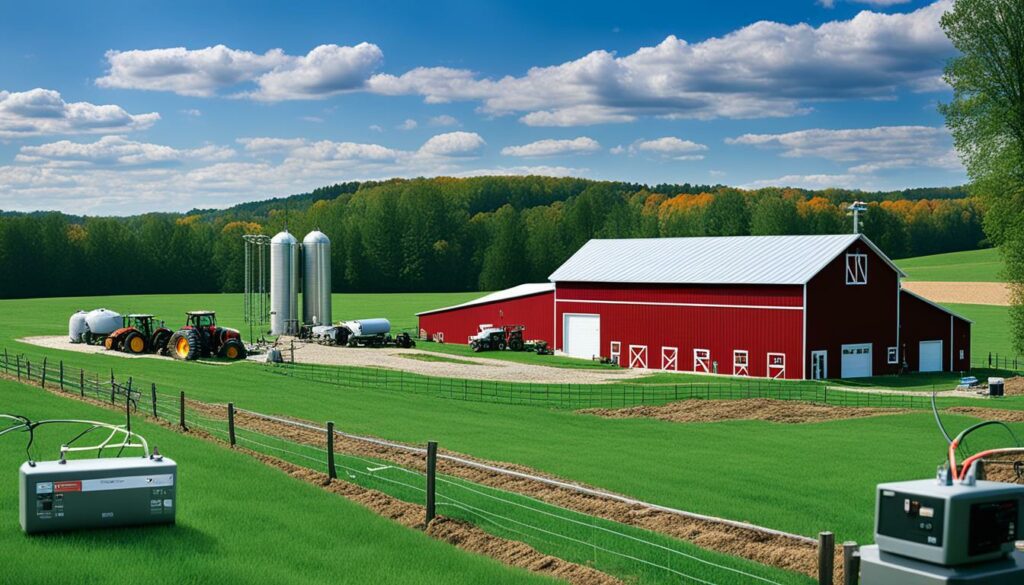
Grounding farm electrical systems properly means wiring the hot and neutral parts correctly. This is an important part of following farm electrical standards. It ensures your electrical equipment works as it should and offers a safe path to the earth.
It’s also important to train your family and workers how to cut power during electrical emergencies. This skill can significantly improve safety in situations involving fallen powerlines or broken equipment.
Regular checks of wiring and extension cords are a must to catch and fix any damages early. And making sure all electrical parts are suitable for their use helps keep the system running safely.
If there’s something complex or big that needs fixing, get help from a Licensed Electrical Contractor. Working with a professional helps to ensure your farm meets the top farm electrical standards. This protects your farm’s efficiency and safety.
Follow these steps carefully, and you’ll know you’re doing everything you can to ground your farm’s electrical systems properly. This is crucial for safety and meeting the necessary standards.
Keeping farms safe from electrical dangers is very important. Around 30 to 40 people get electrocuted on farms every year. These accidents can be reduced by checking the electrical systems often.
When checking farm electricals, we look at the wires and panels. We also make sure there’s enough space around them to stop dangers. It’s key to check outdoor electricals too, especially in tough conditions. For example, heavy rain places need special, tough materials to keep safe.
Devices like ground fault circuit interrupters (GFCIs) are great at spotting when electricity leaks at dangerous amounts. They cut the power off to make sure nobody gets hurt. Lockouts are also used to keep machines off during repairs, making farms safer.
Testing and fixing parts regularly keep farms safe. Insurers may offer deals if regular inspections are done. These checks not only cut the chances of accidents but also meet insurance rules. Having no check report after a fire can cause trouble with insurance pay-outs.
Safe electrical wiring on a farm is crucial. It’s vital to have good safety rules in place to avoid risks. The right wiring and covers keep everything safe for the people and the machines.
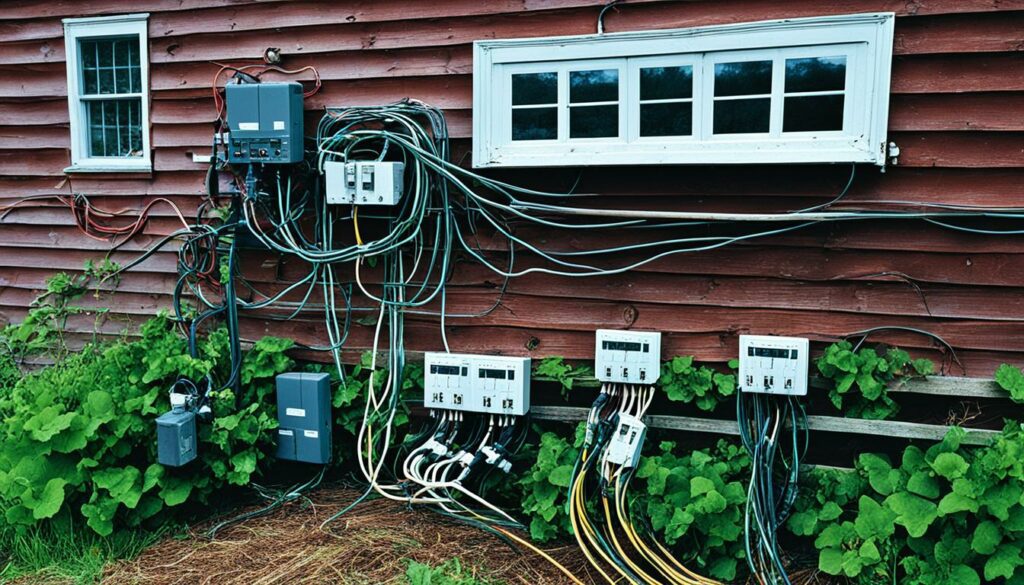
Picking the best cables is key for farm safety. Use underground cables for wet or corrosive areas. They last longer and are safer. Use things like control boxes and switches that won’t rust. This stops fires and electric shocks.
Moisture and dust are big enemies of farm wiring. Protect line connections with watertight covers to avoid shocks. This keeps your electrical system working well.
Use enclosures over lights and explosion-proof switches in dusty spots. These steps are vital to stop dangers from the environment.
Grounding is very important for farm safety. It stops electric shocks and protects machines. Use Ground Fault Circuit Interrupters (GFCI) in places that need them. These cut the power fast to prevent harm. Check them every month to make sure they work well.
| Task | Frequency | Safety Benefits |
|---|---|---|
| Inspect GFCI receptacles | Monthly | Prevents electrical shocks |
| Check electrical panels clearance | Ongoing | Reduces risk of fires |
| Use corrosion-resistant fixtures | As needed | Enhances longevity of electrical systems |
On farms, overhead powerlines are a common feature. It’s vital to manage them safely to avoid accidents. For overhead powerline farm safety, farmers should always keep at least ten feet away. They need to plan and map where all the powerlines are. This shows the safest routes for moving equipment around.
Putting up fences to mark areas with low-hanging lines is an important safety step. It’s also critical to keep all equipment, antennas, and people fifteen feet from the lines. This makes sure there’s no accidental contact.
OSHA says correctly grounding electrical systems is key against accidents. Make sure potentially wet areas have Ground Fault Circuit Interrupt (GFCI) outlets. Also, using lockout switches stops machines from starting on their own when they’re being fixed.
Every year in the United States, 62 farm workers are electrocuted, as reported by the National Ag Safety Database, highlighting the critical need for effective electrical safety protocols.
If you see a downed powerline, remember: stay away, call 911 or the electricity company, and don’t try to handle it yourself. Staying alert and following safety guidelines is crucial to protect everyone on the farm.
Lockout switches are critical for keeping farms safe. They help by turning off all electrical power when needed. This is important when fixing equipment, stopping dangerous accidental starts, and preventing fires.
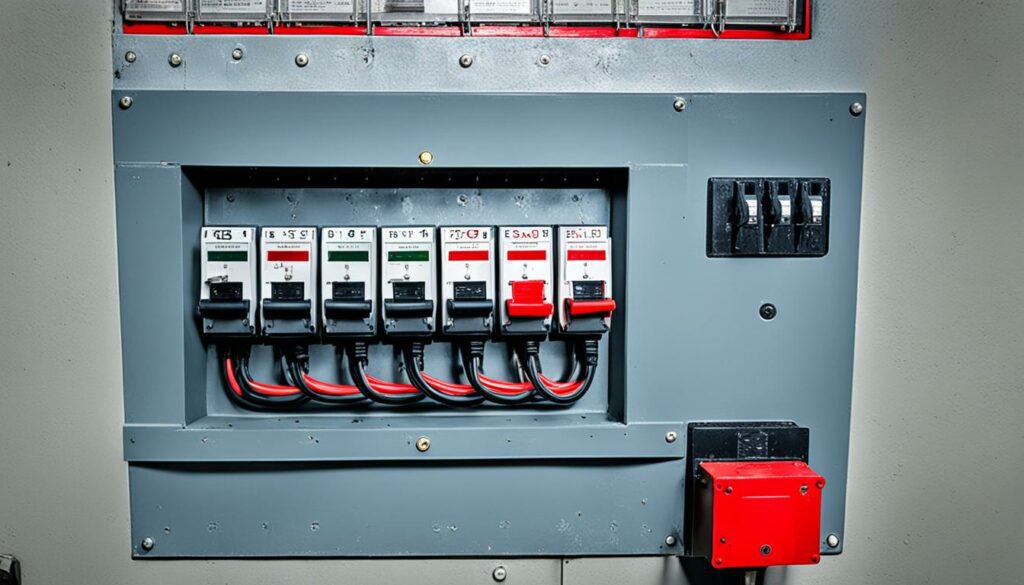
It’s vital to use lockout switches the right way on farms to stop machines starting by accident. These switches cut off all energy to machines. This means no electrical, thermal, chemical, or other kinds of power can reach them. This keeps farm workers safe when they’re fixing things.
The lockout process must be very careful. Workers need to find all power sources for the equipment they’re working on. They then tell everyone who might be affected and put a tag on the switch, showing it’s been turned off. This makes sure the machine can’t start accidentally, keeping everyone who works on the farm safe.
Having a centralised lockout switch helps a farm react quickly in an electrical emergency. Law says employers must make sure workers are safe, and a lockout switch is one way to do this. If there’s an emergency, turning off all the power at once can save lives. So, it’s important that the switch is easy to get to and anyone who needs to can use it.
Staying safe around electricity in farming is crucial, especially near grain bins. Always ventilate and cut off power before entering. A lockout switch adds extra safety, letting you turn off electricity quickly if there’s a problem.
When you’re inside a grain bin, use a safety harness and line. This protects you in emergencies, helping you get out safely. It’s also important to have someone watching you while you work. They can help fast if you need it.
Knowing about power lines is key for staying safe. The rule is, lines over 600 volts must be 18 feet above the bin’s top. The distance between a bin and these lines varies with the bin’s height. Keeping the right distance keeps you safe from shocks or burns.
| Grain Bin Height | Minimum Distance from Power Lines |
|---|---|
| 15 feet | 55 feet |
| 50 feet | 143 feet |
Near power lines, always stay 10 feet away with any equipment. If machines touch a line, warn others and call the electric company at once.
Using warning signs and marking risky areas can make grain bins safer. Make sure everyone on the farm knows how to be safe around electricity. Regular training is a great way to keep safety in mind.
Keeping farm electrical safety in mind is key to protecting all workers. Marking high-risk electrical areas well is vital. It helps prevent accidents and keeps everyone safe.
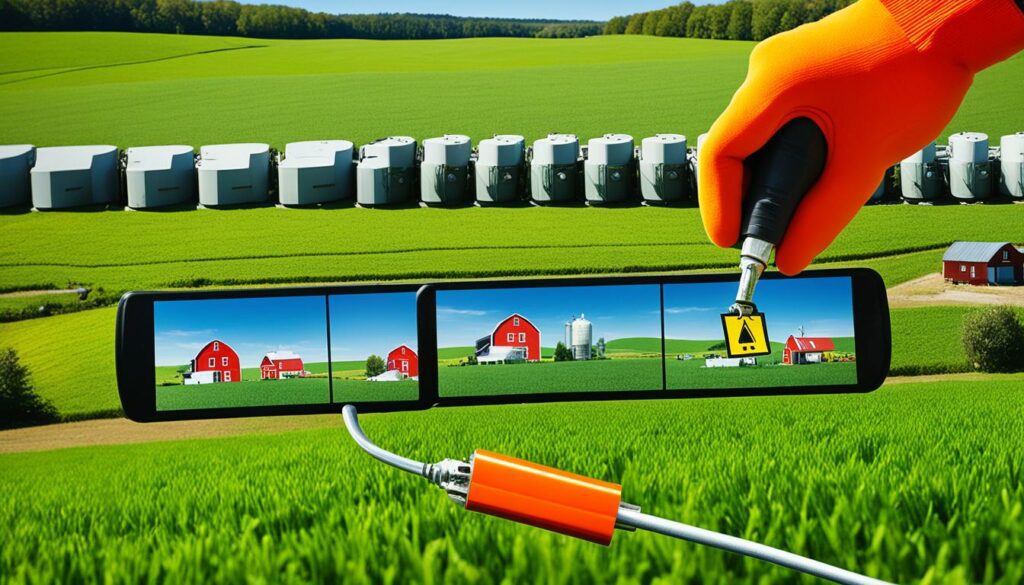
There are many dangers on a farm, like grain bins and chemicals. Properly *marking electrical hazards* is very important. Warning signs and caution tape show where high-voltage areas are. This helps all workers, including new ones and visitors, stay safe.
To keep the farm safe, everyone needs to know about these risky zones. Teaching the staff through regular training is crucial. It ensures everyone follows the safety rules. Marking these areas helps create a safe and cautious culture on the farm, reducing electrical accident risks.
Placing safety signs in risky spots alerts farmworkers to dangers right away. Signs should go where workers, especially those around animals or loud machines, might come close to electrical problems. Good signs and clear messages help keep the farm safe for everyone.
| Electrical Hazard | Safety Measure |
|---|---|
| Overhead Powerlines | Maintain at least three meters distance |
| High Voltage Areas | Use warning signs and caution tape |
| Faulty Wiring | Regular inspections and immediate repairs |
| Machinery Noise | Wear appropriate hearing protection |
In the end, focusing on farm electrical safety with good hazard marking can cut down on accidents. It creates a safe place for everyone. Let’s make sure all workers know how to stay safe around electricity.
Teaching farm workers about electrical safety is key to the farm’s overall safety. By learning about agricultural safety, the dangers of electricity are lessened. A solid education on electrical risks is vital for any farm’s safety efforts.
Workers first need to know how to turn off power during an emergency correctly. They need to learn about downed powerlines and how to keep safe around power wires. It’s essential to remember to keep at least ten meters from downed lines and three meters from working ones.
It’s crucial to train workers on using farm equipment near powerlines. People should stay in their vehicles if they hit a powerline until it’s safe to leave. Knowing about powerlines that might sag can help avoid accidents too.
Safety tips include carrying things like ladders, poles, and pipes with two people. They should be horizontal to avoid touching power lines. Workers must also check GFCI plugs and breakers every month to make sure they work.
Making sure the farm’s electrical system is properly grounded is also important. All tools need to be safe, and wires should be checked for damage regularly. This helps prevent electrical problems.
Everyone working on the farm, both family and hired hands, should know how to cut the power in an emergency. They should use equipment designed for outdoor use. Training should also show the importance of talking to a qualified electrician about the farm’s electricity to keep it safe.
“Distance is the best protection against electrical hazards. Always stay at a safe distance from any powerlines to prevent accidents.”
Keeping electrical installations safe on farms is vital. The certified electricians in agriculture know how to ensure farm systems meet top safety standards. This lowers the chance of accidents a lot.
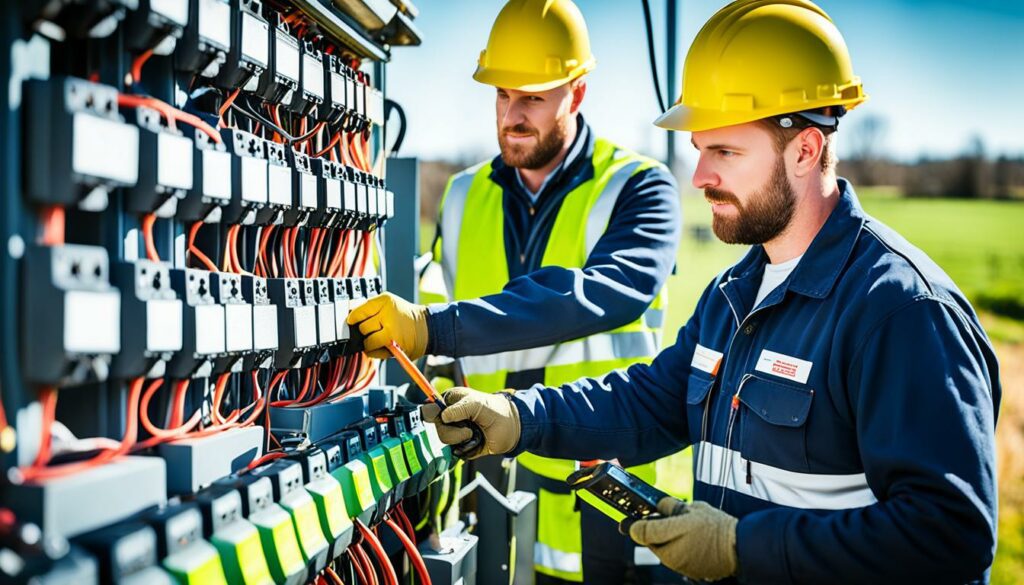
Sticking to farm safety regulations keeps everyone safe. Certified electricians follow these rules, using special materials like UF cables for safety. They keep farms safe from dangers like high moisture and animal waste.
Here’s why working with certified electricians is important:
Keeping farms hazard-free is key. Certified electricians in agriculture are experts at handling farm electrical needs. From setting up protections for generators to installing safe switches, they do it all. They make sure only experts touch the systems, avoiding electrical troubles.
Farm places have unique risks, like animals chewing on wires. So, using protections like conduits for wires and covers for lights is smart. Letting qualified electricians install and watch over these setups is vital. Here’s why:
| Risk Factor | Preventative Measure |
|---|---|
| Animal Waste Corrosion | Use corrosion-resistant materials |
| High Humidity | Install underground feeder cables |
| Physical Damage | Utilise conduits for wiring |
Choosing certified electricians means you’re serious about farm safety. They make sure everything stays up to the latest safety standards. This protects both people and animals from electricty-caused accidents. It makes farming safer and more efficient.
Keeping electrical systems safe in any weather is key for farms. It’s important to follow electrical safety guidelines. All devices used outside should be fit for outdoor use. They must handle dust, moisture, and changing temperatures well.
It’s crucial to regularly check electrical fittings. This helps me spot and fix any damage early. Monthly checks on GFCI outlets or breakers stop issues before they start. This careful maintenance keeps the system working well in any weather.
Grounding the farm’s electric system is very important. It ensures safety and the proper functioning of farm tools. Large tools like augers and combines can be dangerous near powerlines. Staying three meters away from these lines helps prevent accidents.
If vehicles touch powerlines, they should not move until it’s safe. Everyone should stay 10 meters away until workers say the powerlines are off. This is because even protective gear doesn’t fully protect against electric shocks.
It’s also essential to keep power poles and lines clear. A 20 feet space is needed for single-phase lines and 30 feet for multi-phase lines. This prevents trees from growing into the lines and causing problems.
By following these rules, I make sure the farm is safe all year. Regular maintenance is crucial for keeping everything running smoothly. It helps prevent accidents and keeps the farm running without trouble.
Farm electrical safety is key and needs a lot of attention. It’s not just about simple checks. We need a detailed approach to stop accidents. The National Electrical Safety Code (NESC) outlines key advice, like keeping a clear zone of 18 ft around grain bins. This helps lower the chances of harm from power lines above.
Good safety on the farm means keeping at least 10 ft between power lines and tools. Everyone working on the farm should know this rule. There should be regular checks to remind people of their duties and the danger from power lines.
It’s very important to plan routes for big machines to avoid power lines. If there’s a power line accident, stay in the vehicle and get help to turn the power off. If you must escape due to a fire, jump away from the vehicle to avoid more hits. Knowing that our bodies can carry electricity helps us realise how vital these steps are, especially in storms. By strictly following these rules and working with experts, we keep our farm safe. This way, we make sure every worker stays out of harm’s way.
Keeping electrical systems safe is key to avoid fires, injuries, and deaths. To do this, we check the outlets’ grounding, make sure wires are secured, see if cords are in good shape, ground our tools correctly, and watch out for power lines.
Key dangers are power lines without protection, damaged wiring, and circuits taking on too much power. These dangers can cause fires, electric shocks, and risky work conditions.
Check for Ground Fault Circuit Interrupters (GFCI) in damp spots. Make sure all tools are grounded well. And see that outlets are the safe, three-hole kind.
Good grounding means having a clear path to the earth. This stops dangerous voltages building up. Make sure tools are checked often, and machinery’s wiring is done right.
Inspecting often helps find and fix electrical problems early. This means checking wiring, cords, and equipment for wear. It also ensures outdoor items can handle the weather.
Choose the right cables and protect all connections from the weather. Keep out moisture and dust, use watertight covers, and connect hot and neutral wires properly.
Don’t let equipment touch power lines by watching its height. Keep at least ten feet away from power lines. Map out where the lines are and plan safe routes to avoid them.
Lockout switches stop machines from starting by mistake. They can also turn off all power fast during crises. This stops accidents and helps protect workers during maintenance or fires.
To stay safe in grain bins, make sure they are well ventilated and electricity is off before entry. Always use a safety harness, work with a spotter, and have a lockout switch ready.
Mark dangerous electrical spots with signs and caution tape. This shows where it’s not safe to go. It keeps everyone, new and old, alert about the risks.
Training saves lives as it teaches how to cut power in an emergency, spot dangers like downed power lines, and stay away from overhead wires. Knowing this helps avoid serious accidents.
Certified electricians make sure all electrical work meets the right standards, from proper grounding to system management. They’re critical for farm safety, knowing the best practices inside out.
To withstand weather, systems should be well sealed and rated for tough conditions. Check them regularly, and keep the area around them clear. This prevents problems and keeps the farm safe.